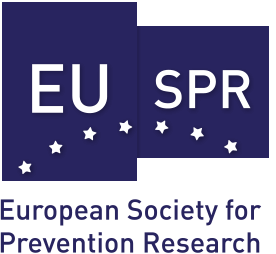
- Fourth EUSPR Conference Presentations – 2013 ParisThe conference presentations can be downloaded at the following links by EUSPR Members and conference attendees: Conference speaker presentationsConference poster presentations The workshop presentations can be downloaded at the following link by EUSPR Members, SPAN Members and pre-conference workshop attendees: Workshop presentations
- EUSPR Conference – Speaker PresentationsEUSPR Members and 2013 Conference attendees Plenary Speaker Presentations Please see below for the PDFs of the presentations from the plenary speakers. Plenary Session 1 i) For Whom do they work? Understanding moderators of outcome in family and parenting interventions (Prof Frances Gardner, University of Oxford, UK) ii) The influence of gender on moderating prevention …
- EUSPR Conference – Poster PresentationsEUSPR Members and 2013 Conference attendees Posters A selection of posters presented at the conference can be downloaded via the links below: 1. The impact of smoking policies on recent quitters prevalence in Italy in the last three decades (Dr Alessandro Coppo; 1st place poster prize) 2. Eff ects of Prevention Programs based on the Results of …
- EUSPR Conference – Workshop PresentationsEUSPR Members, SPAN Members and 2013 Pre-Conference Workshop Attendees EUSPR/SPAN workshop on Testing Mediating Mechanisms and Moderating Factors in Prevention Work Dr Metin Özdemir and Dr Fabrizia Giannotta EUSPR/SPAN workshop on Development and Evaluation of Complex Preventive Interventions i) Development and specification of novel behavioural interventions (Emma Davies) ii) Designing and Planning Research to assess …
- Fourth EUSPR Conference SummaryOn 13-15 November 2013, the 4th International Conference of the EUSPR on ‘Understanding differences in prevention outcomes’ was held in Paris, France. The conference focused on the important role of modifiers of prevention outcome, and examined the best ways in which diversity can be incorporated into research and practice. We had an exciting and varied …
- EUSPR Conference – Poster Competition WinnersWe held a special guided poster session as part of Day 2 of the conference. There were prizes for the best Early Career Posters including cash prizes and one year’s free Society membership. The poster prizes were supported by the Science for Prevention Academic Network (SPAN) The winners of the poster competition were: 1st Place …
- Discussion of prevention research priorities in the USA and EuropeHarold Perl (Chief, Prevention Research Branch, NIDA, USA) – The NIDA Prevention Portfolio General overview of NIH and NIDA; Review of some of the most recent and relevant findings emerging from the NIDA portfolio of prevention science; Description of several specific areas of prevention research questions that NIDA expects to emphasize and support in the …
- Post-graduate student ForumAngelina Brotherhood (University of Vienna, AT) – Spaces of substance use – a typology Space is relevant to many aspects of drug use, be it as a space of consumption or as a means of preventive or other intervention (such as smoking bans). Yet most research on the role of space in drug use appears …
- Fourth EUSPR Conference – Plenary Speakers and ProgrammeWe are extremely pleased that our plenary speakers for the Fourth EUSPR Conference will be: Prof Frances Gardner, University of Oxford, (UK) – What factors are likely to moderate the outcomes of family based prevention? Dr Federica Vigna-Taglianti, University of Torino, (IT) – The influence of gender on moderating prevention outcomes Prof Linda Collins, Penn …
- Transportability of EBPThe transportability of evidence-based programmes: conceptual issues and empirical examples Dr Nick Axford, Dr Vashti Berry, Prof Frances Gardner Most rigorous trials of evidence-based programmes are undertaken in a few high-income countries – mostly the US. Policy makers across Europe are increasingly interested in importing such programmes. This is unsurprising: arguably it is not feasible …
- Mediation Analysis workshopTesting Mediating Mechanisms and Moderating Factors in Prevention Work Aim: In recent decades, there have been major advances in the design of studies to evaluate efficacy and effectiveness of preventive interventions. These advancements contributed to the quality of evaluation studies and the confidence in the findings. Most evaluation studies still focus only one of the …
- Screentime related prevention research“Prevention of problematic and addictive use of screen media – a call for action” The first part of the workshop will give a comprehensive and critical introduction into the topic and give positive examples from new German and Spanish interventions. Paula Bleckmann, Hanover, Germany “Current state of media effects research – first evidence of its …
- Travel and Accommodation – 2013 ConferenceTravel Paris is easily accessible from all over the world. As travel options are so numerous we recommend that you visit the official Paris tourism website for specific guidance. The conference is located at Le Centquatre, 5 Rue Curial, 75019 Paris, France. (MAP) The nearest Metro stop is Stalingrad (19th Arr.) Hotels Please note that …
- Programme13th November – Pre-conference workshops 0930 – 1700 EUSPR/SPAN workshop on Mediation Analysis This workshop will be led by Dr Metin Özdemir and Dr Fabrizia Giannotta of Örebro University (SW) and introduce concepts of mediation, moderation, latent growth curve modelling, and multiple mediator models. The afternoon session is a practical class which will allow participants …
- EUSPR Conference 2013, 13-15 November 2013, Paris, FranceFourth EUSPR Conference, 13-15 November 2013, Paris, France “Understanding differences in prevention outcomes” Further information is available on the link. View the full post
- Fourth EUSPR Conference and Members’ Meeting, 13-15 November 2013, Paris, FranceUnderstanding differences in prevention outcomes It is well known that differences in health and wellbeing within and between populations are influenced by a range of biological and social factors. However, less attention has been given to identifying how differences in these factors may influence the experiences or outcomes of prevention work. Prevention interventions and policies …
